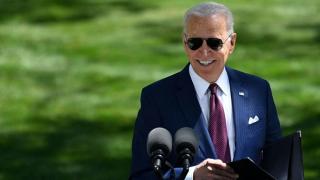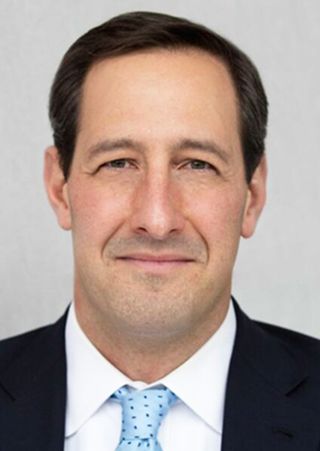Today, Joe Biden concludes his first hundred days in office.
While there is neither a constitutional nor a statutory significance to the first hundred days of a US president's term, it has become a politically resonant marker for the public, media, and scholars to judge a new administration's accomplishments and setbacks. In this case, there has also been political and legislative whiplash, as the Biden administration has made dramatic reversals from the Trump administration in almost every area.
The American tradition of marking the first hundred days in office dates back to Franklin Roosevelt's hyperactive opening salvo in 1933, which saw him sign 76 new laws. His administration's pace out of the gate was so fast that the American comedian Will Rogers remarked: "Congress doesn't pass legislation anymore - they just wave at the bills as they go by."
A more useful way to evaluate Biden's early days in the White House is to examine his administration's track record thus far in promoting domestic initiatives and advancing foreign policy priorities.
While it might be an artificial milestone, it is the period in which a president's political clout is often most powerful. It is also an early indicator of the direction a new administration will take, and how successful they will be in doing so. Biden himself invoked this milestone frequently on the campaign trail, to lay out his agenda, and once in office, as a deadline against which to measure certain initiatives. Much commentary will focus on the number of laws passed and compare it to what Biden's predecessors accomplished. A more useful way, however, to evaluate Biden's early days in the White House is to examine his administration's track record thus far in promoting domestic initiatives and advancing foreign policy priorities.
In contrast to the chaotic early days of the Trump presidency, in which Trump assumed office seemingly unprepared to govern, the Biden team took advantage of the transition period to line up a series of consequential domestic initiatives, which he rolled out within days of assuming the presidency.
Since taking office, Biden has signed more than 60 executive orders, including rejoining the Paris Agreement on climate change, ending the ban on US entry from Muslim-majority countries, ordering mask-wearing mandates on federal property and on all forms of public transportation, expanding access to Covid vaccines, invoking the Defense Production Act to ramp up supplies for the pandemic response, and ordering gun control measures to help curb gun violence. Potentially more consequential, and certainly more politically demanding, have been the legislation he has overseen, including the passage of a $US1.9 trillion COVID relief bill, the advancement of $US2 trillion legislation introduced to support infrastructure, and the proposal of at least another $US110 billion for the bipartisan Strategic Competition and Endless Frontiers Acts, designed to resource America's competition with China across all dimensions of national power.
While Biden has struggled to gain bipartisan support in the House and Senate for his initiatives, polling shows that these efforts, and his early administration, are supported by most Americans. The achievement of more than 200 million vaccines doses (more than doubling his initial pledge of 100 million jabs in 100 days) has a 72 per cent approval rate, and has bolstered his overall job approval to 59 per cent.
Washington and Canberra have also made a promising start on pushing back against Beijing's attempts at economic coercion, standing up a critical and emerging technologies working group, and working together to narrow the gap between Washington and Canberra on climate change.
Biden's relatively high approval rating is likely to help support his ambitious foreign policy agenda. In his first 100 days on the national security front, he has made several significant moves. In addition to announcing an end to the two-decade war in Afghanistan and hosting a climate summit for world leaders, Biden has focused on the Indo-Pacific region by convening the first-ever leaders meeting of the Quad countries, sending his Secretaries of State and Defense to Tokyo, Seoul, and Delhi, meeting senior Chinese officials in Anchorage, and hosting Japanese Prime Minister Yoshihide Suga at the White House. Less visible, but no less significant for how the administration will ultimately prioritise and fund its approach to national security, has been the issuance of the interim National Security Strategic Guidance and the establishment of a China taskforce at the US Defense Department.
This brisk pace has also translated into forward momentum in the Australian-US alliance. President Biden and Prime Minister Morrison Zoomed in for the Quad leaders meeting, and together with their Japanese and Indian counterparts, penned an op-ed for The Washington Post pledging their practical co-operation as "democratic nations" to "ensure that the Indo-Pacific is accessible and dynamic, governed by international law and bedrock principles such as freedom of navigation and peaceful resolution of disputes, and that all countries are able to make their own political choices, free from coercion". This presented both a positive vision for region and offered an explicit rebuke of China's increasingly repressive and hostile actions.
Washington and Canberra have also made a promising start on pushing back against Beijing's attempts at economic coercion, standing up a critical and emerging technologies working group, and working together to narrow the gap between Washington and Canberra on climate change. While policy differences remain, particularly surrounding the best way to address climate change, this is a promising start that presages the more difficult business of delivering results in those critical areas. The pace and frequency of meetings between Biden, Morrison, and their senior officials is likely to increase - at the annual bilateral AUSMIN in the southern hemisphere winter, at the opening of the UN General Assembly in September, and at Biden's Summit of Democracies towards the end of the year - affording them multiple opportunities to continue their work together.
Biden has reached the 100 day mark of his administration with his domestic recovery launched and his foreign policy coming into increasingly sharper focus. None of this is to say that the path ahead will be easy for him. What he faces next are the real tasks of putting together a budget, dealing with an extremely divided American public, overseeing a halting economic recovery and working to stem increasing Chinese and Russian aggression, all in the midst of a still-raging global pandemic.






